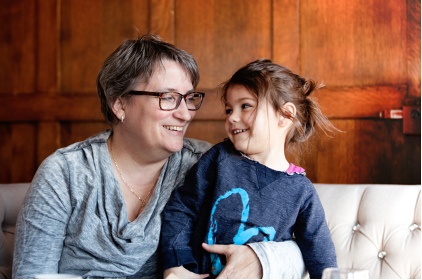Community & Purpose
Foster skills through volunteering
“More than ever, it is critical we strive for a foster carer recruitment approach that is in-step with how society has changed over time. Ensuring we have a robust and child-centred process is our absolute priority.” - Jenny McNaughton, Berry Street Deputy CEO and Executive Director of Services

Having a safe place to call home is something so many of us take for granted. Yet for thousands of vulnerable children in our community that is no certainty and having protection and support is vital to ensure they have the best possible chance in life.
Across Australia around 174,700 children received child protection services in 2019-20 as a result of safety issues at home - an increase of 3.8 per cent from 2017.
Nationally 46,000 children who received protection services in 2020 were in out-of-home care (a 7 per cent increase from 2017). Sadly, around 30,600 children were in this situation for two years or more.
Berry Street, one of Australia’s largest independent family services organisations, has been supporting children, young people and families for 145 years. Today, we offer a diverse range of programs including financial education*, out-of-home care, education, housing, family violence support and trauma services.
Foster care offered by Berry Street provides children and young people under the age of 17 with a safe and nurturing home.

Source: Berry Street
Children are placed in foster care when there isn’t a family member or person in their social network to care for them. Foster care can be for just a few days or much longer depending on the situation.
But what happens if there aren’t enough foster households to accommodate those in need?
Types of foster care
Respite care: providing full-time carers, parents or guardians a regular break (one or two weekends a month).
Emergency care: for children who are at risk and need a placement immediately (usually with little notice).
Short-term care: a few weeks to six months. These children are often reunited with their family.
Long-term care: for children who need a longer stay – usually more than six months.
Retaining carers
There has been a decrease in foster care households across the country in recent years and this is in part to do with the recruitment process for potential foster carers.
Only a very small percentage of people who contact Berry Street about becoming a foster carer go on to complete the training to become accredited.
More than ever, it is critical we strive for a foster carer recruitment approach that is in-step with how society has changed over time. Ensuring we have a robust and child-centred process is our absolute priority. We also want potential foster carers to have a positive recruitment experience. We are committed to developing innovative recruitment processes that harness diversity, inclusiveness and flexibility to ensure vulnerable children and young people have safe and caring homes.
To address this Berry Street has developed a new plan to help recruit and retain foster care households in Victoria through an improved, digital recruitment and onboarding process.
Supporting the project, skilled volunteers from ANZ’s Process Engineering and Governance team reviewed Berry Street’s end-to-end foster care recruitment process over several months using Lean Six Sigma methodologies.
Led by Product Owner Kathryn Scully, the team provided more than 170 hours of skilled volunteer time. They surveyed staff, conducted root cause analysis, facilitated two half-day workshops, identified process improvements and provided recommendations.
ANZ’s focus on skilled volunteering in recent years saw 38 per cent of employees offer their time and expertise in this way in 2021 compared to 29 per cent in 2020.
Source: 2021 ANZ ESG Supplement
A team effort
Kathryn was inspired by the power of skilled volunteering through her experience at a former employer.
“Since joining ANZ, I began exploring the opportunity for our teams to work more closely and learn from each other,” she says. “We established a consulting style engagement model to support our community partner, Berry Street.”
Kathryn says it’s amazing to see how an initial idea brought the team together to deliver valuable work while also creating a sense of belonging and achievement for its members.
Reflecting on how the experience significantly impacted her plans for the future, Jessica Boxshall, ANZ Journey Expert says “while this opportunity helped me gain another level of confidence in my professional skills, Berry Street’s work inspired me to hopefully become a foster parent myself one day soon!”.
Virtual delivery
All engagement was successfully completed virtually due to COVID-19 restrictions.
ANZ led a series of workshops then recommended four key initiatives to improve the recruitment and onboarding process of foster carers.
The Berry Street team thoroughly enjoyed working with our ANZ volunteers. It’s been an amazing experience and their insights will directly inform positive changes as part of our transformation work to grow our foster care program.

Virtual workshop facilitated by ANZ volunteers with the Berry Street team.
Details about Berry Street and foster care is available online.
Jenny McNaughton is Deputy CEO and Executive Director of Services at Berry Street.
*For close to 20 years, Berry Street has partnered with ANZ to deliver financial education programs, Saver Plus and MoneyMinded in the community.
Related Articles:
Communities
Flying together, supporting the flock
Communities
